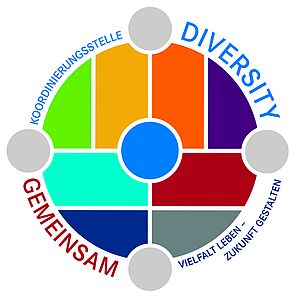Abstracts
Andrea GERMER (Düsseldorf)
Queer carnival and fascist moments: Your Name (2016)
Katharina HÜLSMANN (Düsseldorf)
Queer readings and potentials of the Boys’ Love genre and communities
IINO Yuriko (Tokyo)
‘Queering’ disability may be possible, but …
KANNO Yuka (Doshisha)
Framing: lesbian representability and the genealogy of girls’ culture
KAWAGUCHI Kazuya (Hiroshima Shudo)
Consuming identity and lifestyle: transforming queer subjects in Japan
KAWASAKA Kazuyoshi (Düsseldorf)
LGBT rights are human rights, but in what sense?
Ilse LENZ (Bochum)
Queering gender and capitalism: A comparative perspective
Vera MACKIE (Wollongong)
Thinking sexual citizenship through the family
MANO Yutaka (Hiroshima Shudo)
LGBT education in Japan: grassroots activities in curriculum development
Dorothée de NÈVE (Gießen)
Merkel’s gut feeling – debate about marriage for all in Germany
Konstanze PLETT (Bremen)
Legal views on sex and gender in Germany
Jasmin RÜCKERT (Düsseldorf)
Queer space in television drama
Elisabeth SCHERER (Düsseldorf)
Queer wedding ceremonies in Japan
SHIMIZU Akiko (Tokyo)
Marriage equality as strategy: family registration, moral conservatives, and the “LGBT” fad in Japan
TANIGUCHI Hiroyuki (Kanazawa)
Jurisprudence on LGBT sexuality in Japan
John TREAT (Yale)
Put to the test: abjection and sexual citizenship in Japan
Andrea GERMER (![]() Düsseldorf)
Düsseldorf)
Queer carnival and fascist moments: Your Name (2016)
Shinkai Makoto’s animation ‘Your Name’ enjoyed extraordinary box office success in East Asia. The film combines the theme of a world in disarray from natural catastrophe with a queer/body-switching story between a girl and a boy. Such a performative ‘world turned upside down’ forms a central theme in the history of carnival, which can paradoxically work to stabilize hierarchical social and gender relations. In the film, it is the final hetero-normative pairing of a boy and girl, coupled with an ethno-national binding (musubi) with the Shinto gods, that restores the ‘natural order’. Accepting the religio-cultural exoticism underpinning this animation, viewers (of any nationality) become conscripted in the recreation of what Alan Tansman (2009) called ‘fascist moments’ within Japanese literary texts.
Katharina HÜLSMANN (![]() Düsseldorf)
Düsseldorf)
Queer readings and potentials of the Boys’ Love genre and communities
The Boys‘ Love genre of homoerotic narrative fiction received criticism (yaoi ronsō) in the 1990s that was particularly aimed at its commodifying representations of gay male characters. It is often assumed that the writers and readers of Boys’ Love are heterosexual women, and that these works reproduce homophobic views. In recent years, however, critics such as Mizoguchi Akiko have also begun to point out the potential of the Boys’ Love genre as a queer productive sphere. Indeed, the genre of Boys’ Love narratives is diversifying in terms of content, gender images, and the community that creates and shares these narratives.
IINO Yuriko (![]() Tokyo)
Tokyo)
‘Queering’ disability may be possible, but …
We all know that our bodily and mental states fluctuate throughout our lives, although we tend to assume a dichotomous distinction between disability and normalcy. In Japan, this tendency has been enforced by disability policies where a medical examination and disability certification determine whether or not a person has a disability. With the enforcement of new disability laws in the past few years, however, we are experiencing a shift from a medical discourse to one on social or human rights. Will this shift help us to de-essentialize disability categories? Or will it impose new restrictions upon people with disabilities? This report presents both the possibilities and the constraints for claiming disability before the law.
KANNO Yuka (![]() Doshisha)
Doshisha)
Framing: lesbian representability and the genealogy of girls’ culture
Queer female intimacy and its erotic possibilities were, and still are, at the core of girls’ culture and girls’ films in Japan. How, then, does such intimacy, desire, and relationality become intelligible? My paper takes up friendship and kinship as frames for lesbian representability, while exploring the narrative and visual strategies that make such representability possible. In doing so, I will trace the genealogy of girls’ culture under which same-sex desires and intimacy run as an undercurrent. By paying attention to both the transnational and transgenerational nature of girls’ culture in Japan, I will interrogate how queer female intimacy frames the transmedia practice of girls’ culture.
KAWAGUCHI Kazuya (![]() Hiroshima Shudo)
Hiroshima Shudo)
Consuming identity and lifestyle: transforming queer subjects in Japan
In this presentation, I will explore how sexual minorities—primarily gay men—have lived, and how their issues have transformed during these past 20 years in Japan. For this purpose, I will look at how human rights discourses on sexual minorities have emerged, and how these sexual minorities have gained visibility through the forces of the media, market and consumption. I will also consider how these processes may be related to the neoliberal economic and social regime.
KAWASAKA Kazuyoshi (![]() Düsseldorf)
Düsseldorf)
LGBT rights are human rights, but in what sense?
The idea of LGBT rights in Japan over the past few years has been strongly influenced by U.S. policy, as the Obama administration employed a strategy situating LGBT rights as part of American soft power to be promoted by the U.S. Embassy in Japan. In this presentation, I contextualize and analyze what has been changing within LGBT rights discourses during the Trump era. I also discuss how LGBT human rights discourses have evolved compared with other human rights issues in Japan, in order to ascertain why LGBT rights activism—especially regarding issues of same-sex partnership—appears to be successful in campaigning for a new form of human rights.
Ilse LENZ (![]() Bochum)
Bochum)
Queering gender and capitalism: A comparative perspective
Whereas the literature on capitalism and gender tends to focus on the stabilising effects upon gender dualism, as well as issues of inequality and heteronormativity, I will argue that capitalism is presently contributing in various ways to gender pluralism as an innovative force. For example, women and queer persons have become more visible in midrange jobs within the workforce. The tertiarisation, economisation and subjectivation of work implies the increasing importance of human capital and higher educational degrees, leading to some diversity—particularly within the tertiary sector. The formerly homogeneous male core work force is now consequently changing, with diversity schemes enhancing this trend. I would like to ask, therefore, whether we are experiencing the transition to a flexible gender order within post-industrial welfare states such as Japan and Germany.
Vera MACKIE (![]() Wollongong)
Wollongong)
Thinking sexual citizenship through the family
From the late twentieth century increasing attention has been paid to the concept of sexual citizenship. Discussion of citizenship has moved from narrow discussions of nationality and the ability to vote and stand for public office to more expansive notions of national belonging. While these discussions have tended to focus on the public spheres of government and employment it is also worth focusing on the family. In this paper I focus on discussions of alternative family forms in contemporary Japan and the implications for considering the dynamics of sexual citizenship.
MANO Yutaka (Hiroshima Shudo)
LGBT education in Japan: grassroots activities in curriculum development
Japan's National Teaching Guidelines made no mention of sexual diversity until 2010, when the Ministry of Education put forward detailed approaches for handling so-called “Gender Identity Disorders”. Subsequently, a handbook concerning support for sexual minority students was made available for teachers and faculty members in 2016. Since this time, some schools have begun conducting workshops and developing curricula in accordance with the need for diversity and inclusion in the classroom. In this paper, I will introduce cases of grassroots activities in curriculum development that show how teachers adopt the concept of sexual diversity to their classrooms. Through these examples, I aim to give an overview of current LGBT education in Japan.
Dorothée de NÈVE (![]() Gießen)
Gießen)
Merkel’s gut feeling – debate about marriage for all in Germany
Gay and lesbian activists have called for equality of homosexual partnerships since the 1990s. This initiated a discussion on equal rights, which reached its most recent success with the granting of ‘marriage for all’ in October 2017. Beyond the legal process and the gradual development of legal norms at this time, controversial discussions also took place among the German public. The aim of my presentation is firstly to explain the process of political demands and legislation, secondly to examine the controversial debates and citizen attitudes, and thirdly to discuss which issues remain to be addressed in terms of equal rights.
Konstanze PLETT (![]() Bremen)
Bremen)
Legal views on sex and gender in Germany
The German language does not distinguish between sex and gender. The noun Geschlecht comprises both meanings (and a third as well: that of lineage, or House). A new ruling of the Federal Constitutional Court (Oct 10, 2017), however, uses only the word ‘gender’ in its English translation. In my presentation, I will give examples of law reforms that I consider crucial for the development from sex to gender in the German legal terminology. I will connect these with contributions made by the women’s and gay/lesbian movements, and more recently, the transgender and intersex movements. For further discussion, I will sketch some of the manifold consequences of the Constitutional Court ruling that orders legislators to find solutions either by doing away with official registration of Geschlecht, or by allowing for a third option beyond male and female.
Jasmin RÜCKERT (![]() Düsseldorf)
Düsseldorf)
Queer space in television drama
In television dramas featuring queer characters, designated spaces such as restaurants and bars that are visited by mostly non-heterosexual people fulfill specific functions. They are often staged as the setting wherein queer characters meet peers for the first time, or as background scenery for a coming-out performance. This paper interrogates the perspective from which such places are shown, while making references to non-fictional and commonly known queer places in Japan. Can the imagined places depicted in the TV series be interpreted as demonstrations of ‘queer spaces’ that provide opportunities to subvert normative assumptions about gender and sexuality?
Elisabeth SCHERER (![]() Düsseldorf)
Düsseldorf)
Queer wedding ceremonies in Japan
Wedding ceremonies, considered to be important rites of passage, are an expression of a society’s view of relationships, sexuality and family. During the era of modernization in Japan, wedding ceremonies became an important political arena wherein the programme of nation-building included the (now public) celebration of monogamous heterosexual marriage. Until recently, the possibilities for queer couples to celebrate their unions were very limited. This has changed in the past few years, however, with the wedding services industry now regarding queer couples as new customers, and extending them various commercial offers accordingly. This paper traces such developments, and discusses the importance of these ceremonies’ increased presence and visibility.
SHIMIZU Akiko (![]() Tokyo)
Tokyo)
Marriage equality as strategy: family registration, moral conservatives, and the “LGBT” fad in Japan
Marriage equality has become one of the most popular, if not the most important, among the political agendas for LGBT/queer movements in many countries of “the West”. In Japan, however, same-sex marriage cannot simply be a matter of equality between gay and straight couples. Marriage here is first and foremost a matter of the family registration system, which Japanese conservatives have fiercely guarded as the country’s moral core. This presentation examines how the call for equal marriage is starting to become strategically deployed by some LGBT activist groups, as well as by hard-core moral conservatives, during the last few years.
TANIGUCHI Hiroyuki (![]() Kanazawa)
Kanazawa)
Jurisprudence on LGBT sexuality in Japan
Until recently, there have not been many lawsuits, legislative advances or administrative measures related to LGBT/sexuality issues in Japan. The atmosphere of Japanese jurisprudence changed in this regard, however, when the so-called "Same-sex Partnership Ordinance" was passed by Shibuya Ward in 2015. This paper focuses on the recent development of legal discourses on two topics: same-sex marriage (marriage equality), and the legal criteria to change gender markers within legal documents. In addition, I will introduce several cases that are now pending in Japanese courts.
John TREAT (![]() Yale)
Yale)
Put to the test: abjection and sexual citizenship in Japan
Beginning with the recounting of a personal experience of an involuntary HIV test in Japan in 2015, Treat explores work on abjection by LGBT scholars and its intersection with recent critiques of the concept of sexual, or "intimate," citizenship and the social activism based on it. Reference will be made to several works of Japanese popular fiction, including Yoshi Yū's *Ayu no monogatari * (English title: *Deep Love*) and Anno Moyoko's *Happy Mania*.






